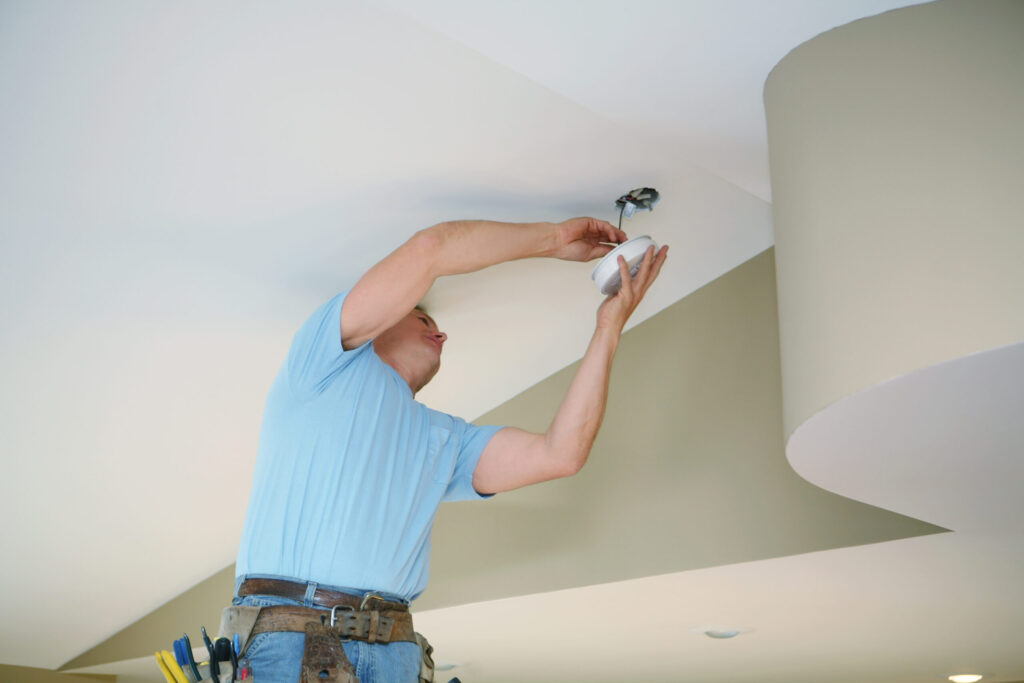Smoke detectors protect you and your family from harm by sounding the alarm in the event of a fire in your Idaho home. According to the National Fire Protection Association (NFPA), roughly three out of five home fire deaths occur on properties with either no fire alarms or malfunctioning fire alarms. However, a smoke alarm that constantly beeps or chirps for no apparent reason is frustrating and can indicate that something is wrong with the device. A look at the most effective ways to stop chirping or beeping can provide guidance on responsible ownership of this life-saving device.
What Are the Two Main Types of Smoke Alarms?
The NFPA recommends installing a smoke alarm in each bedroom, outside of each sleeping area, and on every level of your house. There are two main types of smoke detectors: battery-operated alarms and hardwired alarms.
Battery-Operated Smoke Alarms
Battery-operated smoke alarms are self-contained devices that derive power from disposal or rechargeable batteries. They are easy to install and more economical than other detectors. Since they use batteries, these smoke alarms can continue to work during a power outage. However, these alarms still require regular testing and consistent battery replacement. Problems with battery-operated alarms can cause beeping that requires troubleshooting to fix.
Hardwired Smoke Alarms
Hardwired smoke alarms operate on your home’s electric grid. These devices require professional installation. Hardwired smoke detectors are often interconnected. This means that when one smoke alarm goes off, the remaining smoke alarms also activate to alert residents in any location within the home. While these alarms require the electric grid, you can ask about installing battery backups to help ensure continued operation during a power outage.
What Do the Different Types of Smoke Alarm Beeps Mean?
Regardless of the type of smoke alarm, odd beeping or chirping noises can indicate something is wrong. Learning how to identify and describe the beeping noise helps you take the appropriate action and allows a professional to swiftly repair any malfunction.
Continuous or Blaring Beeps
A series of loud or continuous beeps usually signifies smoke or fire. If you have a single alarm, the smoke is nearby or on the same home level as the device. If you have interconnected detectors, the smoke could come from any location in the home. Even if you do not see a fire, take the necessary precautions to evacuate the home and investigate. Smoke can come from something as commonplace as burning food or from an unexpected but serious issue like a malfunctioning furnace.
Single Beeps
Single beeps refer to chirps that occur between 30 seconds and one minute apart. These beeps often indicate that the battery needs to be replaced. However, they can also signify that there is dirt, dust, or debris blocking the sensors. Some smoke alarms emit single beeps when they have reached the end of their lifespan and need to be replaced.
Multiple Beeps
If your smoke alarm begins to emit multiple beeps, you may have one or several indoor safety issues. For example, combination smoke alarms monitor both smoke and carbon monoxide (CO) levels. Multiple beeps often signify a sharp rise in CO content in your home. Evacuate the area and call a professional for assistance.
Irregular beeping in battery-powered smoke alarms can indicate exposure to extreme temperatures and humidity. If someone has installed your smoke detector in the wrong location, the device may get too hot or cold to function correctly. Finally, irregular beeping in hardwired smoke alarms could indicate a sudden change in electrical current. Contact a professional to investigate the issue.
What Are Common Causes of Unexpected Smoke Alarm Beeps?
While the origin of some smoke alarm beeps may be as simple as a low battery, there are other possible causes as well. These common reasons include the following:
- Dust or dirty in the sensing chamber
- High humidity in the home
- Too much direct sunlight
- Poorly installed batteries or loose drawers
- Residual charge from previous battery
- Pull-tab problems in new smoke alarms
- Tripped circuit breaker
- Manufacturer defects in the alarm
How Do I Stop My Smoke Alarm From Beeping?
The process for stopping a smoke alarm is simple. For battery-operated smoke alarms, this can be as simple as pressing the “test” or “silence” button. If your smoke alarms are interconnected, you may need to flip the “smoke” switch on your breaker box. Please note that this is only a temporary solution, and leaving a smoke detector disconnected is very unsafe. The best solutions for fixing a beeping smoke alarm include correcting battery problems or sensor issues. In addition, you may need to address changes in temperature, humidity, and electrical current. Some beeping problems may require you to replace the device itself.
Replace Batteries and Reset the Device
A professional can test the batteries and wiring in your devices to ensure that everything is in working order. These routine tests should occur during regular home inspections or if you suspect an issue. If the batteries are old or faulty, replace them and reset the device.
Close the Fire Alarm Battery Drawer
Sometimes beeping occurs because the battery drawer is not closed all of the way. This inhibits the drawer from making proper contact with the smoke alarm’s terminals. If you identify a beeping alarm and see that the drawer is open, close it to resolve the problem. Drawers that are loose or defective may require repairs or replacement.
Remove the Battery Peg or Pull Tab
In addition to a loose drawer, there are other reasons the battery may fail to make contact with the smoke alarm’s terminals. Another common reason is a blockage or obstruction. This usually results from a failure to remove the pull tab or security peg from a recently installed battery. Remove the tab so that the batteries can connect with the detector’s terminals.
Clean the Dirty Sensing Chamber
Smoke alarms can easily collect dust or dirt over time. Unfortunately, they can also become hiding places for pests like ants or spiders. You should also add smoke alarm cleaning to a routine maintenance checkup with an HVAC professional or electrician.
Correct Any Temperature or Humidity Fluctuations
Extreme changes in temperature and humidity can trigger beeping. This is why most experts recommend professional installation. If the smoke detector is installed too close to a vent or register, it may sound a false alarm. Smoke detectors installed too close to windows can also sound false alarms if bright sunlight hits the sensing chamber. Since humidity can also cause a false alarm, most professionals avoid installing detectors too close to bathrooms. If constant false alarms become a nuisance, schedule an appointment for an electrician to relocate your smoke detectors.
Install New Smoke Alarms
If none of these troubleshooting steps help, it may simply be time to replace your device. As smoke alarms approach 7 to 10 years of age, they may cease operating properly. Consider this an opportunity to upgrade or modernize your devices. Do not forget to install smoke alarms in any areas your family members may frequent, like basements or hallways near bedrooms. Many municipalities require detectors to be installed in every room of the house.
Contact Us Today
Beeping smoke alarms can create disturbances in the home. They can also signify that something is very wrong. Fortunately, [company_name] provides smoke alarm services for homes in Magic Valley and Treasure Valley. We install and test smoke detectors as well as carbon monoxide detectors. In addition, we conduct safety inspections and can review your electrical panels and outlets. Safeguard your family with additional features like surge protectors and backup generators.
Contact [company_name] today to schedule an appointment.


